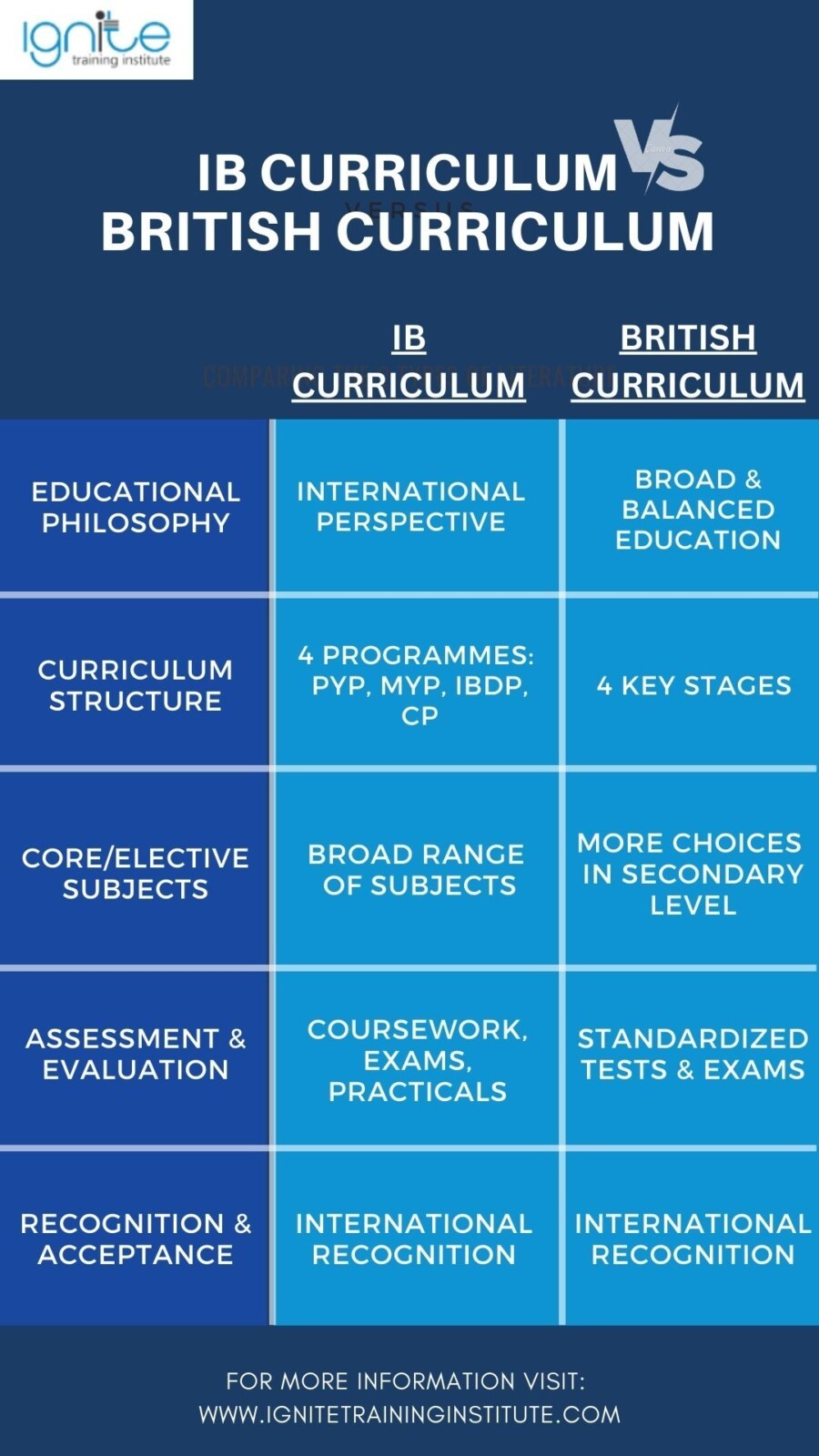Education is a crucial aspect of a child’s life, and parents always want to ensure that their children receive the best education possible. With so many educational programs available, it can be challenging to decide which one is the best fit for your child. Two popular educational programs that are widely recognized around the world are the International Baccalaureate (IB) Curriculum and the British Curriculum.
In this blog post, we will explore the differences between the two programs, their educational philosophies, core subjects, teaching methodologies, and assessment methods. By the end of this post, you will have a better understanding of which program may be the best fit for your child’s needs, interests, and academic goals. So, let’s dive in and explore the IB Curriculum VS the British Curriculum.
Furthermore, Ignite Training Institute offers full tutoring assistance for IB Curriculum & British Curriculum. Get in touch with our expert consultants today!

What Is IB Curriculum?
The International Baccalaureate (IB) Curriculum is a globally recognized educational program that aims to develop students’ intellectual, personal, emotional, and social skills to become lifelong learners, thinkers, and contributors to society. It offers a comprehensive and challenging curriculum that prepares students for higher education and the demands of the workforce.
The IB curriculum was founded in 1968 in Geneva, Switzerland, to provide a comprehensive education to students that transcends national boundaries and encourages cultural awareness and an international outlook. Today, it is offered in over 5,700 schools across 160 countries, including both public and private schools.
The IB curriculum is structured in three programs:
- Primary Years Programme (PYP) for ages 3-12 years
- Middle Years Programme (MYP) for ages 11-16 years
- Diploma Programme (DP) for ages 16-19 years
- IB Career-Related Programme (CP) for ages 16-19 years
The IB programmes has a unique curriculum framework that provides a holistic education that balances academic rigor with creativity, critical thinking, and personal development. It promotes a learner-centered and inquiry-based approach to education that fosters creativity, critical thinking, and intercultural understanding.
Related: Top 5 Benefits Of The IB Curriculum You Must Know To Get Started
What Is The British Curriculum?
The British Curriculum, also known as the National Curriculum of England, is a standardized program of study that outlines the knowledge and skills that students should acquire during their school years. It is used in state schools in England and Wales, as well as in many international schools around the world.
The British Curriculum is structured in four Key Stages:
- Key Stage 1: for students aged 5-7 years
- Key Stage 2: for students aged 7-11 years
- Key Stage 3: for students aged 11-14 years
- Key Stage 4: for students aged 14-16 years
Each Key Stage has a set of subjects that students are expected to study, including English, Mathematics, Science, Design and Technology, Computing, History, Geography, Art and Design, Music, Physical Education, and Modern Foreign Languages.
The curriculum is designed to provide a broad and balanced education that enables students to acquire the knowledge, skills, and understanding that they need to succeed in life. It focuses on developing key competencies such as literacy, numeracy, critical thinking, communication, and problem-solving skills.
The British Curriculum also emphasizes the development of personal, social, and health education (PSHE) skills, which are essential for students to lead healthy, balanced, and fulfilling lives. PSHE topics may include relationships and sex education, mental health, financial literacy, and citizenship.
Related: List Of Top 10 Benefits Of The IB Diploma Programme
IB Curriculum VS British Curriculum: Exact Differences
The International Baccalaureate (IB) Curriculum and the British Curriculum are two distinct educational programs that have different approaches to learning, teaching, and assessment. Here are some of the key differences between the two:

1. Educational Philosophy & Goals
The IB curriculum is designed to provide students with an international perspective and encourage them to become global citizens. It emphasizes inquiry-based learning, critical thinking, creativity, and intercultural understanding. The British Curriculum, on the other hand, focuses on providing students with a broad and balanced education that emphasizes literacy, numeracy, and key competencies such as communication, problem-solving, and critical thinking.
2. Curriculum Structure
The IB Curriculum is divided into three main programmes:
- PYP (Primary Years Programme) – Ages 3 to 12: Focuses on developing the whole child through transdisciplinary themes and inquiry-led learning.
- MYP (Middle Years Programme) – Ages 11 to 16: Builds academic and personal skills across eight subject groups, with an interdisciplinary approach.
- DP (Diploma Programme) – Ages 16 to 19: A challenging two-year pre-university course including six subject groups, the Extended Essay, Theory of Knowledge (TOK), and CAS (Creativity, Activity, Service).
The British Curriculum is structured into four Key Stages:
- Key Stage 1 (Ages 5–7)
- Key Stage 2 (Ages 7–11)
- Key Stage 3 (Ages 11–14)
- Key Stage 4 (Ages 14–16), culminating in GCSEs
- Key Stage 5 (Ages 16–18), usually involving AS and A-Level studies
Each stage builds sequential knowledge and prepares students for national exams, offering a clear academic progression.
3. Core & Elective Subjects
In the IB, students must take subjects across six broad categories: Language & Literature, Language Acquisition, Individuals & Societies, Sciences, Mathematics, and The Arts. This ensures a well-rounded education.
Additionally, the DP includes unique core components: the Extended Essay, Theory of Knowledge, and CAS, which nurture research skills, philosophical thinking, and personal development beyond the classroom.
The British Curriculum offers a more specialized approach, especially at secondary levels. At the GCSE and A-Level stages, students can select subjects based on their strengths and interests.
For instance, while core subjects like English, Mathematics, and Science are compulsory at GCSE level, students can choose electives like Geography, Computer Science, Business Studies, or Art. A-Levels allow further specialization, often in 3–4 subjects aligned with future university courses or career aspirations.
4. Assessment & Evaluation
Assessment in the IB curriculum is based on a range of methods, including coursework, exams, and practical assessments. Students are also assessed on their ability to apply their knowledge and skills in real-world situations. The British Curriculum primarily uses standardized tests and exams to assess students’ progress and determine their levels of achievement.
5. Teaching Methodologies
The IB teaching methodology is rooted in inquiry-based and student-centered learning. Teachers act as facilitators, encouraging exploration, debate, and reflection. This method supports the development of independent thinking, collaboration, and global awareness.
The British Curriculum is traditionally more teacher-led, with a focus on delivering content efficiently and systematically. However, modern British schools increasingly incorporate interactive, discussion-based, and problem-solving activities to develop critical skills.
6. Recognition & Acceptance:
Both the IB and British Curriculum are highly respected by leading universities worldwide, including those in the UK, US, Canada, Australia, and Europe.
- The IB Diploma is particularly valued for its academic rigor, breadth of study, and emphasis on independent research and critical thinking. It is often seen as excellent preparation for university-level study.
- The British Curriculum (especially A-Levels) is also widely accepted and offers students the advantage of specialized subject mastery, making it ideal for those with clear academic or career goals.
Related: IBDP Curriculum: A 2024 Guide For Academic Excellence
Is IB Harder Than The British Curriculum?
The IB curriculum is often considered more challenging than the British curriculum due to its comprehensive and holistic approach. IB emphasizes critical thinking, research skills, and a broad range of subjects, including mandatory components like the Extended Essay and Theory of Knowledge.
This can be more demanding compared to the British curriculum, which focuses more on in-depth knowledge of specific subjects and standardized testing like GCSEs and A Levels. However, the perceived difficulty can vary depending on the student’s strengths and learning preferences.
Related: IB Economics Exam: Paper Details & 10 Prep Tips
What Is Better For Students: IB Or British Curriculum?
Deciding whether the International Baccalaureate (IB) Curriculum or the British Curriculum is better for students depends on various factors such as the student’s learning style, interests, academic goals, and future career aspirations. Both programs have their unique strengths and weaknesses, and what might work for one student may not be the best fit for another.
The IB curriculum is designed to provide a well-rounded, internationally-focused education that emphasizes critical thinking, creativity, and intercultural understanding. It is an excellent option for students who aspire to attend university abroad or work in an international setting.
IB schools also tend to have a strong emphasis on community service, which can help students develop a sense of social responsibility and empathy toward others. However, the IB curriculum can be challenging and rigorous, and students need to be self-motivated and able to handle the workload.
The British Curriculum, on the other hand, is designed to provide students with a broad and balanced education that focuses on key competencies such as literacy, numeracy, and problem-solving. It allows students to choose their elective subjects and offers more flexibility in terms of course selection.
The British Curriculum is an excellent option for students who want to pursue a career in fields such as medicine, law, or engineering, as it provides a strong foundation in key subjects such as mathematics and science. However, it may not be as internationally focused as the IB curriculum, and students may need to supplement their education with additional language courses or study abroad programs.
In conclusion, choosing between the IB curriculum and the British Curriculum depends on various factors such as the student’s interests, learning style, and academic goals. It’s also worth noting that many universities around the world recognize both programs and students who excel in either curriculum can go on to achieve great success in their academic and professional lives.
Related: 50 Engaging IB CAS Project Ideas For IB Diploma Students
Moving From IB To British Curriculum: Challenges & Benefits
Transitioning from the International Baccalaureate (IB) to the British curriculum can present both challenges and benefits. One of the main challenges lies in the difference in structure and assessment methods.
The IB curriculum is known for its holistic and inquiry-based approach, emphasizing critical thinking, research, and a broad range of subjects, including the core components of the Extended Essay, Theory of Knowledge, and Creativity, Activity, Service.
Students moving to the British curriculum might find it more content-focused and exam-oriented, with a stronger emphasis on subject-specific knowledge and frequent standardized assessments like GCSEs and A Levels.
However, there are also significant benefits to this transition. The British curriculum’s structured approach can provide clarity and focus, helping students to specialize in subjects of their interest and strength, which can be advantageous for university applications and future career paths.
The familiarity and global recognition of the British system can also offer easier access to universities, particularly in the UK, where A Levels are a standard requirement. Additionally, the well-defined syllabus and exam preparation strategies in the British curriculum can enhance students’ ability to perform well in standardized tests.
Related: Maths Exam Tips Class 10: Proven Strategies To Score 95+ Marks
FAQs
1. Which Is Better: IB Or British Curriculum?
The International Baccalaureate (IB) curriculum is often considered better for its global recognition and focus on critical thinking and holistic education, while the British curriculum (e.g., A-Levels) is valued for its depth in specific subjects and structured approach, making the choice dependent on individual educational goals and preferences.
2. What Is The Difference Between The British Board And The IB Board?
The British Board (often referring to the British curriculum like GCSEs and A-levels) focuses on a standardized UK education system with exams and coursework. The International Baccalaureate (IB) is a global curriculum emphasizing critical thinking, intercultural understanding, and rigorous assessment through a holistic approach.
3. Is The IB Curriculum Better?
The IB curriculum is often praised for its rigorous academic standards and emphasis on critical thinking and global awareness. It provides a well-rounded education but may not suit every student’s learning style or needs.
4. Is The IB Curriculum Good In India?
The IB curriculum is highly regarded in India for its rigorous, globally recognized standards and focus on critical thinking and holistic education. It offers a strong alternative to national curricula, preparing students well for international universities.
5. Which Curriculum Is Best In The UAE?
The best curriculum in the UAE depends on individual goals, but British (IGCSE/A-Levels) and IB (International Baccalaureate) are widely preferred for their global recognition and academic rigor.
6. Which Curriculum Is Best For The Future?
The IB curriculum is often seen as best for the future due to its global recognition, emphasis on critical thinking, and preparation for university and beyond. British and American curricula also provide strong academic pathways.
7. Is IB A UK Curriculum?
No, the IB (International Baccalaureate) is not a UK curriculum. It was founded in Switzerland and is an independent, internationally recognized education program.
8. What Is The Best Curriculum In The World?
There is no single “best” curriculum in the world, as the ideal choice depends on a student’s learning style, career goals, and future plans. However, globally recognized curricula like the International Baccalaureate (IB), British (IGCSE/A-Levels), and Advanced Placement (AP) are often praised for their academic rigor, critical thinking focus, and university acceptance rates.
9. Is The British Curriculum The Same As Cambridge?
Not exactly. Cambridge is a part of the British education system and offers the Cambridge International curriculum, which follows the British framework but is tailored for global schools.
10. Is IB A Cambridge Curriculum?
No, the IB and Cambridge curricula are separate. IB is an independent international program, while Cambridge is part of the UK’s education system and managed by Cambridge Assessment.
11. Is British Curriculum Tough?
The British Curriculum is considered academically rigorous, especially at the GCSE and A-Level stages, but it is manageable with consistent effort and support.
12. What Is British Curriculum Based On?
The British Curriculum is based on the National Curriculum of England, focusing on structured subject learning, literacy, numeracy, and progression through defined Key Stages.
13. Which Country Is IB Curriculum From?
The IB curriculum was developed in Geneva, Switzerland in 1968 and is managed by the International Baccalaureate Organization (IBO).
14. What Is British Curriculum Based On?
The British Curriculum is based on the educational standards set by the UK government, emphasizing subject mastery, assessment, and academic progression through Key Stages.
Conclusion

In conclusion, both the International Baccalaureate (IB) Curriculum and the British Curriculum have their unique strengths and weaknesses. The IB curriculum is internationally-focused and emphasizes critical thinking, creativity, and intercultural understanding, while the British Curriculum provides a broad and balanced education with a strong emphasis on key competencies such as literacy, numeracy, and problem-solving. Ultimately, the choice between the two programs depends on the individual needs, interests, and academic goals of each student.
It’s essential to consider various factors such as learning style, career aspirations, and the type of university or college the student wishes to attend when choosing between the IB and British curricula. However, both programs provide students with a high-quality education that can prepare them for success in their academic and professional lives.
Related: IB VS IGCSE: The Exact Differences Between The Programs


